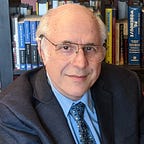An extraordinary television series busts the myth — and the counter-myth — of the French in World War II
Almost every episode leaves a viewer with one overriding question: What would I have done?
Brian De Palma is planning a U.S. adaptation
Third in a series of posts offering entirely unsolicited commentary on my favorite foreign television programs. The first post is here.
There are a couple of reasons why British television drama was long the world leader. One, of course is the BBC which, from the beginning had what the British would call a “remit” to serve everyone, not just offer up the least objectionable program to appeal to a mass audience. (For those too young to remember, that’s how U.S. television worked in the your-only-choices-are-CBC-NBC-and-ABC days.)
But also, (and this is probably related to the above), unlike in the United States, the creative community in Britain; writers, actors and directors, never looked down on television as somehow inferior to cinema.
But in France the attitude was more like that in the U.S. I learned that while reading a review in The New York Times of a television series that shows how much that has changed, and how much French television has matured — well, some French television. In a future column I’ll talk about an entire genre of French comfort food TV.
The series that showed the maturity of French television and maybe, in some ways, of modern France is Un Village Francais (A French Village), streaming on MhZ Choice. Commissioned by public broadcaster France 3, the series tells the story of the Nazi occupation of France and its aftermath in the fictional town of Villeneuve, located near the border between occupied France and it-may-as-well-have-been-occupied Vichy France.
The series is said to be the first time French television came to grips with the reality of the occupation. It accepts neither of the grand myths about that time: Not the one popular for decades in France in which all of the French were noble resistance fighters who despised the Nazis. But also, not the counter-narrative, popular elsewhere, that they were all cowardly, sometimes eager collaborators.
Un Village Francais includes both — and every shade in between. Nor is anyone the same by the time the war is over. Over the course of 72 episodes the characters evolve, slowly and subtly. For some the occupation brings out their best, in others their worst, and in still others both almost at the same time. (To me the most interesting in this regard is the village school principal, Jules Beriot, played by Francois Loriquet.)
Equally fascinating: the politicking within and between factions of the resistance. Early on the Communists don’t know how to respond to an invasion by Hitler, who, at that point, was still an ally of Stalin. Some of the non-Communists allowed their hatred of the Communists to blind them to the threat of fascism.
That’s part of why, for me, the most interesting season was the second-to-last, right after the war is over, when all sides are maneuvering for power and attempting to cast or evade blame. Here’s a trailer which I don’t think will spoil anything:
Then, in the final season, we find out what ultimately happened to the Nazi in charge of the occupation of Villeneuve. But that would be spoiler.
And now comes word that director Brian De Palma plans a U.S. adaptation, set during the Civil War. I’m not sure that will work very well, though he’s reportedly collaborating with the co-creator of the French series.
That there are few scenes of combat makes Un Village Francais no less harrowing — or maybe more harrowing, particularly the season devoted to the deportation of Villeneuve’s Jews. And that’s another thing about the series — most of an entire season may chronicle only a few days in the life of the village.
It doesn’t always work. There are moments of soap opera and one or two coincidences too many. But mostly, it’s a gripping, important drama. As it chronicles day-to-day life under occupation and all of the horrible choices it poses, almost every episode leaves a viewer with one overriding question: What would I have done?
